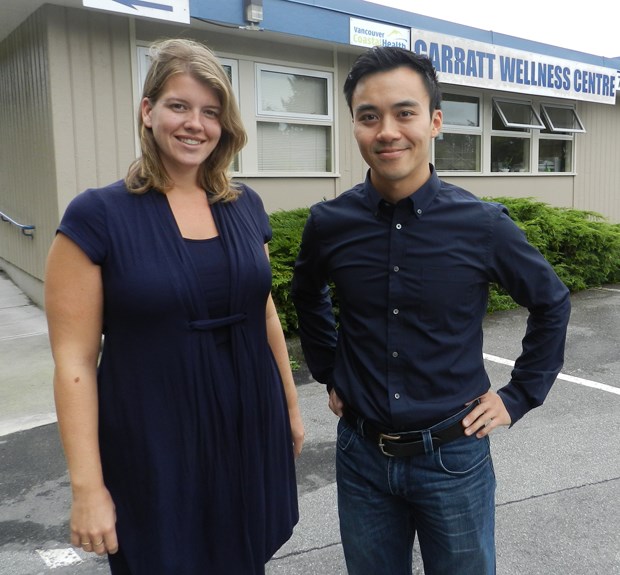When patients in Richmond decide to undergo bariatric surgery to address obesity, they're not only potentially saying goodbye to a significant amount of weight - they're bidding adieu to their former lifestyle and welcoming one that includes exercise, and healthy eating habits and choices.
For some, that can pose a significant challenge. But part of the treatment at Richmond's Westcoast Bariatric Surgery includes pre and post-operative counselling to see patients through the process, for both body and mind.
Taking care of the physical activity side of things is Jonathan Cheung, an exercise physiologist, while Robyn Emde, an occupational therapist, provides counselling. With just 200 or so operations done in Richmond last year - adjustable gastric band surgery can cost about $15,000 and gastric bypass $26,000, funded by the province - a lot is on the line to ensure the process is a success providing ongoing health and quality of life for patients.
But shouldn't a drop in weight automatically mean happier days ahead? It's not quite that simple, said Emde. "The body is a barometer for the mind. So, people of larger size, there's something up, whether it's a past experience, an abuse history, or they've not been able to take care of themselves while possibly taking care of other people," she said.
The initial orientation sessions set the stage for patients, showing them there will be the expectation to get physically active, eat proper meals, and manage their stress levels.
"Some are not up for that and drop out right away," Emde said.
According to figures from Westcoast Bariatric Surgery, more than 70 per cent are able to complete the pre-conditioning process, pre-screening process and then proceed to surgery.
But surgery alone is not a panacea. "We used to have a lot of people come in thinking that surgery is going to cure them. The weight will come off and they will be happy. And it's been proven again and again, for people who keep that mentality it's not the case," Emde said.
Providing support is the Change Ways program, an 11-week process that prepares a patient for surgery from a psychological standpoint.
"We're looking at basically what happened before, what skills are required now to move forward. And that means looking at stress management, communication skills, negative thought processes, and how to boost motivation in certain ways," Emde explained.
The challenge for patients can be overwhelming, that's why the program offers post-operative counselling, as well.
"When life hits the fan, that's when all of our best laid plans can unravel," Emde said. "So, we want to make sure if that happens they can catch themselves, or maybe if they do unravel they have a plan in place to take care of it."
Patients must show they have the ability to live the lifestyle needed after surgery to be successful long-term.
"But they have to start living that way before surgery. Surgery cannot be the first day of the rest of their lives," Emde said.
On the exercise side of the ledger, Cheung said it's also not a simple approach.
"Obesity has a lot of contributors. It's not all just calories in and calories out," he said. "I look at the overall amount of activity they are doing - where they are starting from, what they are comfortable doing.
"For many of them, it's very intimidating this whole aspect of activity." And that requires addressing what has happened in the past.
"Perhaps it's certain habits they've had, or a case where they've been beating themselves up since they were six-yearsold because that's when their mother first put them on a diet that started a repeating cycle of failure after failure," Cheung said.
Clouding the issue for some patients are the unrealistic expectations created by TV shows that focus on weight loss.
"You see people exercising for hours and on a drastically reduced calorie diet - it's not sustainable, research shows that," he said. "However, the public's perception is that it's all a matter of motivation. And if you're motivated enough you should be able to lose weight. That's not the case because we are fighting against physiology and a whole number of other aspects," Cheung said.
The two main things he wants to see are that patients understand and are insightful as to what has led them to obesity, and that they can demonstrate competency when it comes to the lifestyle habits required to stay healthy.
"And that differs for everyone," he said, adding his support lasts long after recovery from surgery.
"In essence, my support is indefinite. But it's up to the individual. People still like to call me every couple of weeks to tell me what they are doing or ask what their program should have. Or others will call to get a bit of a bump in their motivation," he said. "Some people just fall off the grid. But we highly recommend they stay in touch with us. But I can't force them to because that incentive - preparing for surgery - is gone. That's why we view the pre-conditioning process as extremely important to set that tone, to set the standard very high of what we expect."



